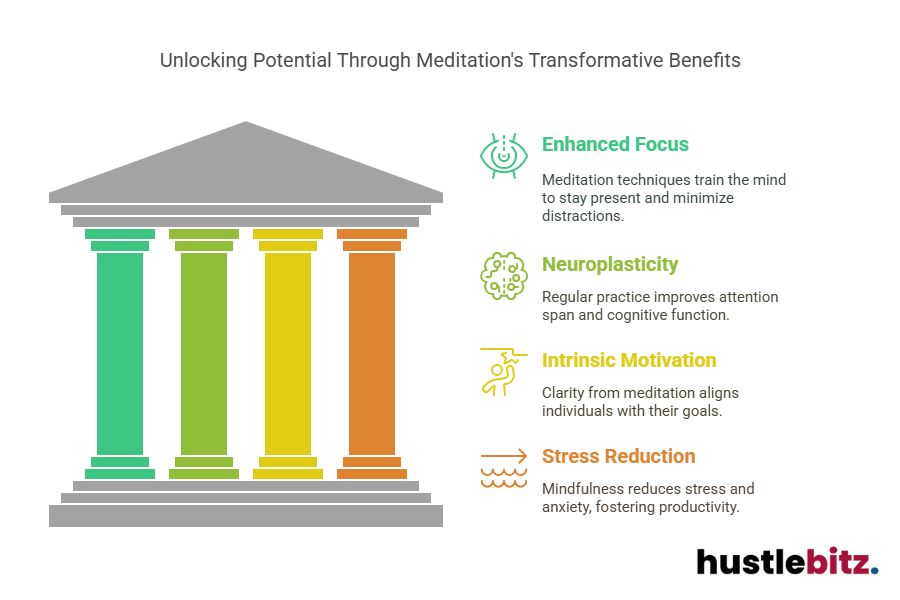Meditation cultivates focus and motivation by training the mind to remain present and attentive. Techniques such as mindfulness and concentration practices help reduce distractions and enhance awareness. By fostering neural changes in areas associated with attention, meditation increases both focus and productivity. It also promotes intrinsic motivation by clarifying personal goals and values, allowing for a deeper connection to one’s pursuits. Regular practice often leads to reduced stress and improved self-awareness, further bolstering motivation. Exploring these concepts further can reveal additional strategies for maximizing the benefits of meditation.
Key Takeaways
- Meditation techniques like mindfulness and concentration enhance focus by training the mind to remain present and minimize distractions.
- Regular meditation practice promotes neuroplasticity, leading to improved attention span and cognitive function.
- Enhanced clarity from meditation fosters intrinsic motivation, helping individuals align with their goals and aspirations.
- Mindfulness reduces stress and anxiety, creating a conducive environment for productivity and goal-oriented behavior.
- Techniques such as breath awareness and body scans increase self-awareness, empowering individuals to recognize strengths and weaknesses for personal growth.

Understanding Meditation Techniques
Meditation techniques can be broadly categorized into several types, each designed to enhance focus and motivation through distinct methodologies and practices. Among these, mindfulness meditation stands out as a particularly effective approach for improving concentration. This technique encourages practitioners to immerse themselves in the present moment, observing thoughts and sensations without judgment. By fostering an acute awareness of one’s surroundings and internal states, mindfulness meditation enables individuals to sharpen their focus and cultivate a greater sense of clarity in their daily activities.
Another prominent category of meditation techniques includes concentration practices, which involve directing attention towards a single object or thought, such as the breath or a mantra. This method helps to diminish distractions and enhances the ability to maintain focus over extended periods. Regular meditation practice, regardless of the specific technique employed, plays a critical role in developing these skills. Engaging in meditation consistently not only reinforces the neural pathways associated with concentration but also promotes greater emotional stability and resilience.
Furthermore, visualization techniques can be utilized to enhance motivation by allowing individuals to mentally rehearse their goals and aspirations. This practice fosters a positive mindset and reinforces one’s commitment to achieving desired outcomes.
Ultimately, understanding and incorporating various meditation techniques into one’s routine can significantly contribute to improving concentration and enhancing overall focus, leading to greater productivity and motivation in both personal and professional endeavors.
The Science Behind Focus

Understanding the neural mechanisms underlying focus reveals how specific brain regions and neurotransmitters interact to enhance attention and motivation. Research indicates that meditation can improve your ability to concentrate by inducing significant changes in the brain. Regular practice has been shown to strengthen areas associated with attention regulation, such as the prefrontal cortex, while simultaneously decreasing activity in the default mode network—an area linked to mind-wandering and distractions.
The following key points illustrate how meditation influences focus:
- Enhanced Attention Span: Meditation cultivates sustained attention, allowing individuals to maintain focus for extended periods.
- Increased Focus and Productivity: By training the mind to return to a single focal point, practitioners can improve their overall productivity and efficiency in tasks.
- Neuroplasticity: Meditation encourages changes in the brain structure, promoting the development of new neural pathways that support improved cognitive functions.
These changes in the brain not only enhance concentration but also foster an environment conducive to increased motivation and goal-oriented behavior. Engaging in meditation regularly can lead to profound benefits, enabling individuals to navigate their daily tasks with greater clarity and purpose.
Ultimately, the practice of meditation serves as a valuable tool for those seeking to improve their focus and productivity, demonstrating its effectiveness in reshaping mental faculties in a positive and impactful manner.
Meditation’s Impact on Motivation

Through the practice of focused attention and mindfulness, individuals often experience a significant boost in intrinsic motivation, empowering them to pursue their goals with renewed vigor.
Meditation helps cultivate a deeper connection to one’s aspirations, encouraging a sense of purpose that can be pivotal in achieving personal and professional objectives.
As individuals engage in regular meditation, they develop enhanced focus, which allows for a clearer vision of their goals. This improved focus not only sharpens attention but also enables individuals to prioritize tasks effectively, fostering a more organized approach to goal attainment.
The positive impact of meditation on motivation is further amplified by its role in reducing stress and anxiety, which often hinder progress and productivity.
Additionally, the practice of mindfulness during meditation promotes self-awareness, helping individuals recognize their strengths and weaknesses.
This awareness can lead to increased self-efficacy, as individuals gain confidence in their ability to overcome obstacles and persist in the face of challenges. Such mental fortitude is essential for sustained motivation.
Techniques for Effective Meditation
Effective meditation techniques can significantly enhance focus and motivation by providing individuals with structured methods to cultivate mindfulness and concentration. Among the various approaches, focused attention meditation stands out as a powerful tool for improving attention. This technique involves directing your awareness to a single point of focus, such as the breath or a specific sound, allowing distractions to fade away. By practicing focused attention meditation regularly, individuals can develop a heightened sense of mental clarity and engagement.
To maximize the benefits of meditation, consider incorporating the following techniques into your routine:
- Breath Awareness: Concentrate on the natural rhythm of your breathing. This simple yet effective method helps anchor your thoughts and fosters a sense of calm.
- Body Scan: Mentally scan your body from head to toe. This practice encourages deep relaxation and enhances body awareness, which can lead to improved focus.
- Guided Visualization: Use imagery to create a mental scene that promotes tranquility and concentration. This technique can help you maintain motivation and clarity in your daily tasks.
Regular meditation not only improves attention but also offers a multitude of meditation benefits, including reduced stress and increased emotional resilience.
Overcoming Distractions

Overcoming distractions is essential for enhancing focus and motivation, as it allows individuals to maintain their attention on tasks and goals without succumbing to external or internal interruptions. In today’s fast-paced environment, distractions come in various forms, from digital notifications to intrusive thoughts. Meditation can help mitigate these distractions by teaching practitioners how to focus their attention effectively and achieve a calmer state of mind.
One of the primary benefits of meditation is its ability to promote mindfulness practice, which encourages individuals to acknowledge distractions without judgment. This recognition allows for a more deliberate redirection of focus back to the task at hand. By regularly engaging in meditation, individuals can train their minds to resist distractions, leading to improved concentration and sustained motivation.
The following table summarizes the key strategies meditation provides for overcoming distractions:
| Strategy | Description |
| Calm Your Mind | Reducing mental noise through focused breathing. |
| Focus Your Attention | Directing thoughts intentionally on specific tasks. |
| Mindfulness Practice | Cultivating awareness of the present moment. |
| Recognize Distractions | Acknowledging distractions without engaging with them. |
Incorporating these strategies into daily routines can significantly enhance one’s ability to overcome distractions, ultimately fostering a more productive and motivated mindset. By committing to a regular meditation practice, individuals can unlock their full potential and achieve their goals with greater ease.
Meditation for Enhanced Focus

Meditation serves as a powerful tool for enhancing focus by training the mind to concentrate on the present moment and minimize mental distractions.
Through consistent meditation practice, individuals can significantly improve their ability to focus, leading to increased attention and productivity in various tasks. The structured nature of meditation encourages practitioners to redirect their thoughts, reinforcing mental discipline and clarity.
Several meditation techniques can be particularly effective in cultivating enhanced focus:
- Mindfulness Meditation: This technique emphasizes awareness of the present, allowing practitioners to observe their thoughts without judgment, thereby reducing distractions.
- Concentration Meditation: By focusing on a single point of reference—such as the breath or a mantra—this practice improves the ability to maintain attention over extended periods.
- Body Scan Meditation: This method involves directing attention to different parts of the body, promoting a heightened awareness of physical sensations and grounding oneself in the present moment.
The benefits of meditation extend beyond mere focus; they also foster a greater sense of calm and clarity, enabling individuals to approach their tasks with renewed vigor.
As practitioners engage in their meditation practice regularly, they often report a marked improvement in their ability to concentrate, resulting in a more productive and fulfilling daily life.
Ultimately, integrating meditation into one’s routine can lead to lasting enhancements in focus and overall cognitive function.
Boosting Motivation Through Clarity

Cultivating clarity of thought can significantly enhance motivation, enabling individuals to pursue their goals with renewed energy and determination.
Through the practice of meditation, individuals can develop a heightened sense of awareness that allows them to identify their true aspirations and the steps necessary to achieve them. By integrating daily meditation into one’s routine, individuals may experience transformative benefits that lead to improved focus and motivation.
One effective meditation technique involves focusing on your breath. This practice not only calms the mind but also helps in clearing mental clutter that often hinders motivation. As you concentrate on your breath, distractions fade away, allowing for a deeper understanding of your objectives. The clarity gained from this mindful practice can illuminate pathways to success, fostering a sense of purpose that drives individuals toward their goals.
Furthermore, the benefits come not just from the act of meditating itself, but from the cumulative effects of consistent practice. Over time, daily meditation can enhance improved attention, making it easier to maintain focus on tasks and commitments.
As clarity increases, so does the ability to motivate oneself, as individuals become more attuned to their passions and the reasons behind their pursuits.
Final Thoughts
Meditation serves as a powerful tool for enhancing both focus and motivation by cultivating mental clarity and emotional resilience. Through techniques like mindful breathing, visualization, and mantra repetition, individuals can significantly improve their ability to concentrate and stay motivated. These practices not only promote a calm, focused mind but also foster a deeper connection to personal goals and intrinsic motivations. By integrating regular meditation into daily routines, individuals can achieve greater productivity and maintain sustained attention amidst distractions. Embracing meditation can transform how we approach tasks and challenges, leading to more effective goal-setting and lasting motivation.




